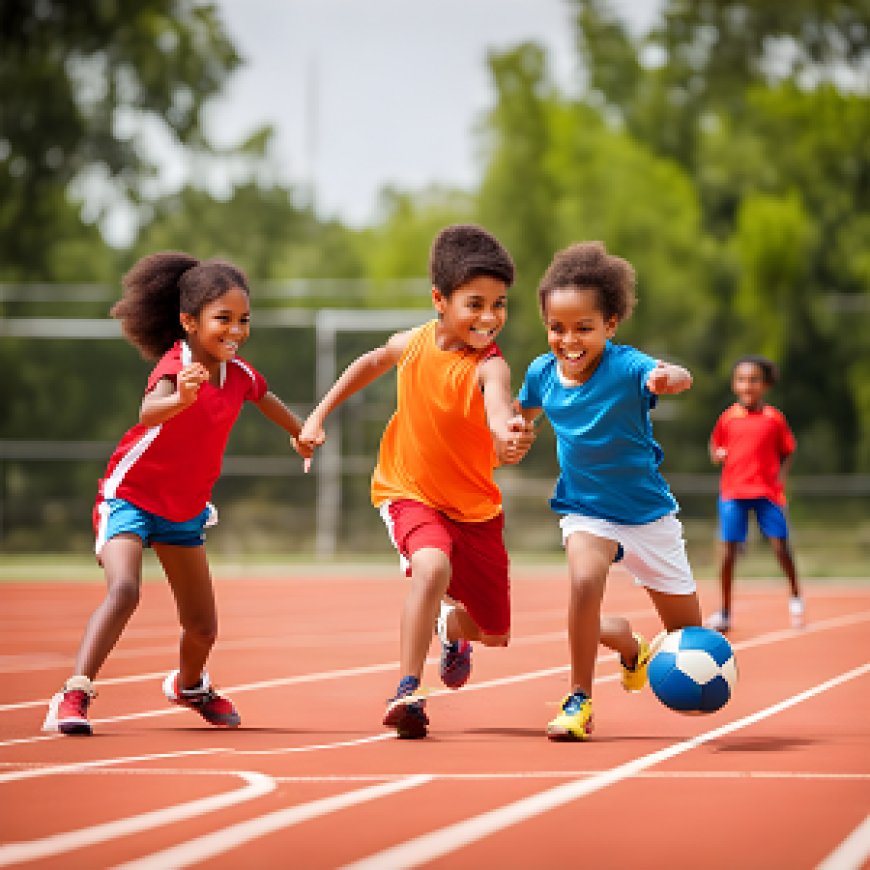Sports and Games: Enhancing Physical and Mental Growth in Children
Sports for children is an essential part of their growth and development. It provides them with an opportunity to move and interact with the world around them in various ways. Through practicing sports and games, children can better develop their physical skills, including strength, fitness, and balance. Additionally, sports help promote overall health and disease prevention. However, it's not just physical growth that benefits from it, as sports also have a positive impact on mental development. They enhance focus and attention, teach children the rules of fair play, and encourage cooperation with others. Therefore, it can confidently be said that sports play a significant role in enhancing the physical and mental growth of children.

Sports for children is a vital part of their comprehensive growth and development. It provides them with a unique opportunity to express themselves physically and mentally and significantly contributes to building a strong foundation of health and natural growth. Its effectiveness is not limited to improving physical fitness and muscle strength alone but extends to include numerous mental and social benefits. In this introduction, we will explore the importance of engaging children in sports and games, highlighting how it plays a pivotal role in enhancing their physical and mental growth.
Benefits of Sports for Children
Sports for children are a crucial physical activity that holds numerous benefits for their physical and mental development. Here are some key benefits of sports for children:
-
Improved Physical Fitness: Sports help children develop strength and physical fitness. They enhance muscle growth and improve the ability to perform daily activities efficiently.
-
Motor Skill Development: Athletic activities promote the development of fundamental motor skills such as jumping, running, walking, and balancing. These skills are essential for coordinating the body and mind.
-
Healthy Weight Maintenance: Sports help prevent excess weight gain and promote healthy weight among children, reducing the risk of chronic diseases like obesity.
-
Enhanced Mental Health: Physical activity through sports contributes to better mental health for children. It reduces stress and anxiety while enhancing feelings of happiness and relaxation.
-
Positive Thinking: Sports teach children the values of fair play, discipline, and perseverance. This can positively impact their personal development.
-
Social Interaction: Sports enable children to interact with their peers and build positive social relationships. They promote cooperation and communication.
In conclusion, engaging in sports is highly beneficial for children as it promotes physical fitness, mental well-being, and various life skills.
Physical Growth Through Sports
Physical growth through sports for children is an essential element in developing their health and physical well-being. Physical activity and engaging in sports are necessary for children for several reasons:
-
Muscle Development: Through activities such as running, cycling, and swimming, children can develop their muscles healthily and increase their muscle strength.
-
Improved Endurance: Sports enhance children's physical endurance, strengthen their heart and lungs, helping them perform daily activities with ease.
-
Fitness Enhancement: Sports help improve children's fitness levels, enhancing strength and overall fitness.
-
Healthy Bone Growth: Physical activity contributes to strengthening bones and promoting healthy bone growth.
-
Obesity Prevention: Engaging in sports helps maintain a healthy weight for children and prevents obesity.
-
General Health Promotion: Physical activity contributes to improving heart health, circulation, and reducing the risk of chronic diseases.
Developing Motor Skills in Children
Developing children's motor skills through sports is a vital process for their growth and development. Motor skills include basic skills that children learn through sports:
-
Fine Motor Skills: These skills include the ability to control movement, balance, and coordinate between the eyes, hands, and feet, which are important for successfully performing daily activities.
-
Gross Motor Skills: These skills include the ability to jump, run, climb, descend, punch, throw, and contribute to improving physical strength and overall fitness.
-
Large Motor Skills: These skills involve the ability to control large body movements such as walking, cycling, and swimming, important for enhancing strength and endurance.
-
Motor Contextual Development: Sports teach children how to interact with their surroundings and control their movements in different environments and situations.
-
Enhanced Focus and Attention: Through sports, children can develop concentration, attention, and the ability to respond to motor tasks.
-
Boosting Self-Confidence: Children's success in developing motor skills increases their self-confidence and their ability to face challenges.
The Impact of Sports on Children's Mental Health
The impact of sports on the mental health of children is undeniable, as sports play a significant role in enhancing the mental well-being of youngsters. Among the positive effects that sports can have on children's mental health are:
-
Stress and Anxiety Reduction: Regular participation in sports helps reduce stress and anxiety levels in children. Physical activity and the release of happiness hormones contribute to improving mood and reducing stress.
-
Enhanced Focus and Attention: Sports activities aid in developing focus and attention, enabling children to achieve better performance in school and daily tasks.
-
Increased Self-Confidence: When children make progress in their physical abilities through sports, it boosts their self-confidence and fosters a positive self-image.
-
Strengthening Social Relationships: Sports provide an opportunity for children to interact with their peers and build strong social relationships, enhancing their sense of belonging to their community.
-
Promoting Discipline and Responsibility: Engaging in sports requires commitment and discipline in training schedules and adherence to rules, helping children develop responsibility skills.
Learning and Development Through Sports Games
Learning and development through sports are essential parts of children's experiences and growth. Sports offer children the opportunity to develop skills and discover their potential in fun and motivating ways. Here are some key aspects of learning and development through sports:
-
Physical Skill Development: Through engaging in sports like running, swimming, and cycling, children can enhance their physical skills, including strength, fitness, and flexibility.
-
Enhanced Social Skills: Team play in team sports encourages collaboration, building social relationships, understanding the rules of fair play, and mutual respect.
-
Learning Values and Ethics: Children learn values such as fairness, discipline, and friendship by adhering to the rules of play and engaging in sportsmanship.
-
Decision-Making Skills: When facing challenges in sports competitions, children learn how to make quick and effective decisions.
-
Boosted Self-Confidence: Success in sports boosts children's self-confidence and reinforces their belief in their ability to achieve their goals.
-
Learning the Importance of Hard Work and Discipline: Sports teach children the importance of hard work, commitment to training, and preparation for competitions.
In conclusion
sports and games play a vital role in the lives of children, significantly enhancing their physical and mental growth. They provide an opportunity to enjoy movement and explore their physical capabilities with fun and adventure. Moreover, they promote physical fitness and contribute to maintaining good health. However, the benefits are not limited to physical growth alone; they extend to mental and social growth as well. Through sports, children can enhance their focus and attention, learn teamwork skills, and cooperate with others. It teaches them moral values and encourages self-worth and resilience.
Therefore, parents and educators should support and encourage children to engage in sports and games as part of their daily lives. By providing the necessary opportunities and resources, we can promote their comprehensive growth and equip them with the skills and values that will help them excel in various aspects of life.
What's Your Reaction?




































































































































































